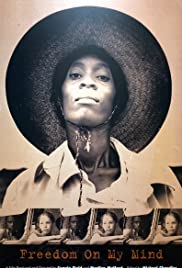Freedom on My Mind (1994)
Freedom on My Mind was released on January 8, 2021, in the USA. The American film was produced and directed by Connie Field and Marilyn Mulford. The film was written by Michael Chandler. The movie was displaying how the registration of African Americans as Mississippi voters goes wild and paid its price to have their rights as voters[1].
Plot

In 1961, segregationist control all things in Mississippi. These controls had brought ruthlessness and harassment towards African Americans. Bob Moses, an African American that grew up in Harlem decided to create the Voter Registration Project when he went to the Mississippi state. As he brought the first African American farmer registered as a voter, a state legislator shot and killed the farmer. For that reason, he and many African Americans in Mississippi collaborated with white students outside Mississippi to bring changes in the segregation law in Mississippi. The coalition faced deaths, tragedy, and threats given by the segregations still, the coalition prevailed and took over the delegates by replacing them with African Americans who then have the voting rights in Mississippi[3].
Black Empowerment
As the film shows, African Americans and white middle-class students from outside Mississippi committed to change the lives of African Americans in Mississippi in the 1960s. African Americans of Mississippi would put their highest effort to fight racism and attain voting rights despite the lack of formal education and experience. While the white-class students from all states in the country came to Mississippi to assist these African Americans to work together. The white students respect African Americans and consider them equally where they call them with their first names. As they tried to break the rigid racist system, they devoted their lives to bring change and some of them died through violence that was done by segregationists. Although they paid the price for committing their life to civil rights, they unseated the white segregationist delegates and replaced them with African Americans whose jobs were sharecroppers, maids, and day laborers yet, they were more compassionate, wise, and caring compared to those delegates. Despite not winning the battle in a near time at the time, the movement and fight had brought hope to African Americans that the future ahead is bright enough for them to have an equal position just like anybody else[4].
Controversy
Before the 1960s, many African Americans in Mississippi faced brutality by the segregationists. As interviewees said, racism at the time was like "blacks were free in name only" where African Americans could be lynched for looking white girls and the segregationists would brag for what they did to African Americans. For instance, Endesha Ida Mae Holland of Greenwood, one of the African Americans in Mississippi, was raped at the age of 11 years old by a white employer. Furthermore, when the protesters tried to change the policy and fight for the rights of African Americans to be Mississippi voters, the segregationists would not hesitate to maintain their status quo by threatening, blackmailing, and murdering several activists. The segregation in Mississippi has turned into a great tragedy in the country where killing and lynching were allowed to kill these innocent people who were only born for being African Americans[5].
References
- ↑ Freedom on My Mind (1994). IMDb. Retrieved January 22 2021
- ↑ Freedom on My Mind Film Poster Amazon. Retrieved January 22 2021]
- ↑ Freedom on My Mind Sundance Institute. Retrieved January 22 2021]
- ↑ Emmanuel Levy. Freedom on My Mind (1994): Docu about Civil Rights Movement Freedom on My Mind EmmanuelLevy. Retrieved January 22 2021]
- ↑ Kenneth Turan. Movie Review : A Study in Black and White : ‘Freedom on My Mind’ Documents Civil Rights Drive in Mississippi Los Angeles Times. Retrieved January 22 2021]